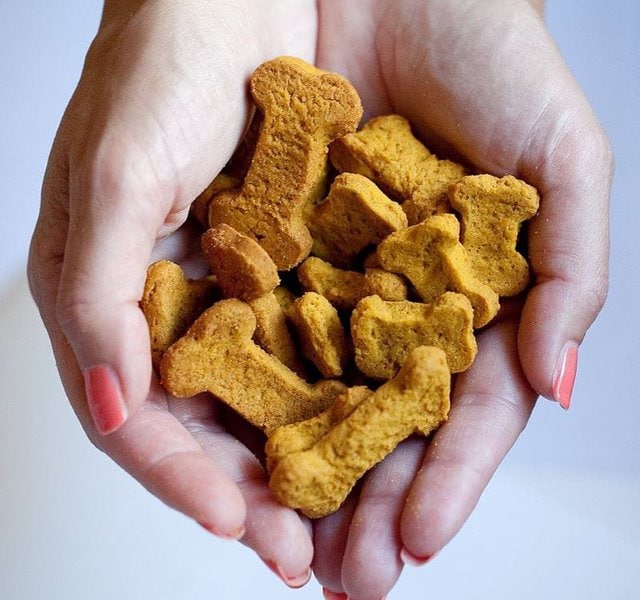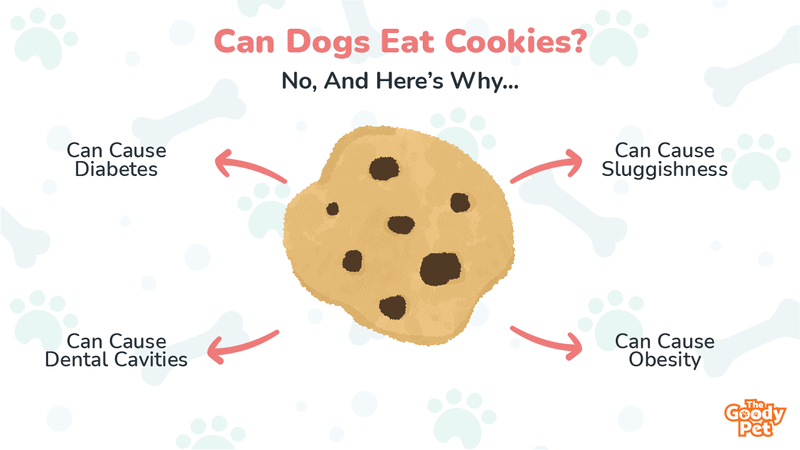Has your pooch ever given you those adorable eyes when you were eating a cookie, and you just had to share? How often do you succumb to that cute doggie whine and give it a little chip? Well, if this keeps happening, you may wonder whether it’s healthy for your pup.
So can dogs eat human cookies? Dogs can eat human cookies because they’re edible and delicious. Nevertheless, giving your dog cookies for an extended period could cause it to have diabetes, amongst other issues, because of its high sugar content.
Do you want to learn more about the effects of giving your dog cookies and how to reverse them? If yes, please keep reading to find out more.
What Happens If Your Dog Eats Cookies?

There are a couple of things that could happen if your dog eats cookies continually. These effects include obesity, sluggishness, diarrhea, dental cavities, and diabetes.
Obesity
As with humans, obesity is a major concern in dogs too. Obese dogs are unhealthy and will likely face issues with their cardiovascular systems.
When you feed your dog too many cookies, its body converts the excess carbs to fats. Then, these fatty compounds are deposited on several areas of the body of your pooch.
When this happens, you’ll begin to notice an increase in the size of your dog. Furthermore, cholesterol from the fat present in the cookies could accumulate in your dog. They would be deposited on its blood vessels and could reduce the efficiency of its blood circulation.
Sluggishness
Sluggishness and low activity level often come with obesity in dogs. When you give your doggie cookies — a snack it’s not supposed to eat — over a long period, it will become less energetic.
Although cookies are filled with sugar that’s normally supposed to keep your dog active, there’s one thing it’s lacking that makes it so dangerous. And that thing is fiber!
The fiber in fruits and vegetables where sugar is naturally gotten from help to slow down the digestion process of sugar. Unluckily, most cookies today have remarkably low fiber content. This means that when your pup eats the cookies, it will have all the sugar in it pumped right into its bloodstream.
Diarrhea
Diarrhea might just be the most harmful issue on this list. It’s a condition that happens to dogs when there’s not enough fiber in their meals or when they eat something they’re not supposed to — like cookies. And believe me when I say that it is a messy problem.
So, if you keep giving your dog cookies, your dog may begin to defecate unstoppably. As a responsible dog parent, do note down the nature of its fecal waste to determine if it is void of any solid.
The lack of fecal solids indicates that your canine buddy will be excreting all the liquid content its body has, leading to dehydration.
From this point, diarrhea can progressively get worse such that your pup can begin to poop blood. And eventually, your furry friend could die if immediate intervention by a vet doesn’t happen.
Dental Cavities
For a canine, dental cavities are a serious issue. This is because they can tend to feed on hard meals such as bones and barely cooked ham.
Unfortunately, giving your dog something unnatural like cookies that contains a lot of sugar exposes it to the risk of having dental cavities. The sugary compounds in cookies tend to wash off the enamel of your dog’s teeth.
Furthermore, when this continues over time, holes will begin to appear on your pooch’s teeth. Unfortunately, if you continually give your dog these cookies, all its teeth will eventually fall off.
Diabetes
You may think that diabetes affects humans only because you haven’t seen a dog affected by it before. Nevertheless, dogs are pretty prone to it when you increase the sugar content of your dog’s diet.
When your dog has excessive sugar in its bloodstream, it tends to become resistant to insulin little by little. After a while, it may become completely unresponsive to this vital substance that regulates the amount of sugar in its blood.
When this happens, insulin resistance can lead to overt diabetes mellitus, from which hyperglycemia may likely follow. Symptoms of diabetes include frequent urination of smelly urine, constant thirst, licking of genitals, and etc.
So, I’m sure these negative effects pretty much answer the question of whether you can feel like giving your dog cookies.
What Cookies Are OK For Dogs?
Dogs can eat the following kind of cookies:
- Whole-grain cookies
- Cookies with vegetables
- Low-sugar cookies
Whole-Grain Cookies

Whole-grain cookies are cookies that contain a lot of fiber. They are made from natural ingredients like wheat that haven’t been broken down to the powdery level. Furthermore, what makes them good for your dog is their role in the digestion process. Even though they may contain little amounts of sugar, the fiber helps slow down their absorption into the bloodstream.
Also, fiber plays an important role in waste egesting. With enough fiber in your pooch’s meal, you’ll be sure your dog won’t have diarrhea. Nonetheless, it would be best to give your dog this kind of cookie once in a while as a treat.
Vegetable-Encrusted Cookies
This kind of cookie is one you can make at home. You can get collard greens and fibrous veggies, such as cabbage, broccoli, and sprouts, and chop them up into tiny pieces. Next, put the chopped veggies into the cookie dough and bake at low heat.
Baking at low heat ensures that the veggies do not lose all of their water content. When it’s ready, you can break the cookie into quarters and give your pup.
As with all cookies, it’s best to give your dog this cookie in small amounts once in a while.
Low-Sugar Cookies
Low-sugar cookies are also a great option for your furry companion. As their name implies, they usually have little amounts of sugar.
Nevertheless, there is usually one problem with those sold at shops. Instead of using sugar in cookies, companies usually add xylitol to brand their cookies as low-sugar.
Cookies containing xylitol tend to be toxic to your pooch. If your dog eats them, the resulting effect is a rapid release of insulin from the pancreas which hypoglycemia may ensue.
So, it is always best to bake your cookies at home with little or no sugar for your dog. One important thing you should do is to avoid letting your pup eat the cookie dough while baking. Do you want to know why? If yes, would you mind keeping reading?
Can Dogs Eat Cookie Dough?
Dogs can eat cookie dough, but it isn’t healthy and safe for them to do so. The yeast contained in the cookie dough makes it rise in your dog’s belly, which can cause an obstruction in its stomach, among other issues.
You may have wondered whether dogs can die from eating cookie dough? Well, they can. The lethal issues associated with dogs eating cookie dough include the following:
Stomach Obstruction

As you may know, there is an essential ingredient in cookie dough called yeast. The role of yeast in the dough is to help the dough rise.
So, if your dog accidentally licks some of the cookie dough, it may be deposited in its stomach and obstruct the path to the small intestine.
Furthermore, the dough will begin to rise, and this will cause your dog to have a tummy ache. Sadly if you don’t take your pup to a vet hospital quickly, it may die of this cause.
Alcohol Poisoning
Because of alcohol toxicity to dogs, alcohol poisoning is a serious issue.
The yeast present in cookie dough can ferment the contained sugar into alcohol as time passes. And because cookie dough is raw, when your dog ingests it, it can stay in its stomach and continue to produce alcohol within.
Sadly, during this period, the yeast fermentation will not stop with time. And the increasing alcohol levels in the stomach of your pooch could mean a slow, painful death.





